Join 40,000+ sales and marketing pros who receive our weekly newsletter.
Get the most relevant, actionable digital sales and marketing insights you need to make smarter decisions faster... all in under five minutes.
Death, as we learned three days after bringing home a goldfish from an elementary school fair, is inevitable. (RIP, Patchy.)
And, unfortunately, it seems that each year we question the usefulness and “life span” of things we once believed were timeless and essential.
Keyword research: Your time is up.
That tool we turned to time and again to dictate the content of our editorial calendars, to tell us how to position each article we posted, and to indicate the interest level of our audience — yeah, people are saying it’s time has passed. It’s no longer relevant.
It’s dead.
But here’s the thing…I’m not so sure I agree with them.
As a content trainer, it’s my job to teach my clients how to structure their content and use all the tools they can to rank high in search.
True, keyword research used to be the workhorse when it came to high search engine result page (SERP) rankings, but, like anything we quickly come to love, our fascination with and how we depend on these things evolve over time.
In 2012, I lived and died by buyer personas. Today, I know there’s more to relating to a buyer than knowing what their background is.
Last year, I was sure I’d spend all my time in the Amazon Go store because it made me feel like I was living in the future. Today, I shop there without even thinking about it.
Sometimes a feature has a fixed lifecycle and something new comes along to replace it. Other times the novelty wears off but it still serves a purpose.
The latter is exactly what’s happening to keyword research.
Is keyword research dead? No.
It’s just surrendered its crown to become one piece of the SEO strategy puzzle.
Keyword research back in the day
When we talk about “keyword research,” what do we mean?
Keyword research came from the still-powerful notion that the way to attract customers is to give them what they want.
By writing about the topics prospects care about, you’ll pull them to your content and brand.
Back in the day, we’d determine this by researching and making lists of long-tail keywords related to our industry, looking at how “strong” these keywords were based on search volume, and writing blog articles that captured those with the highest number.
Emphasis on keywords was so strong, in fact, that HubSpot’s website featured keyword research as the primary tool on its SEO feature page back in 2014.
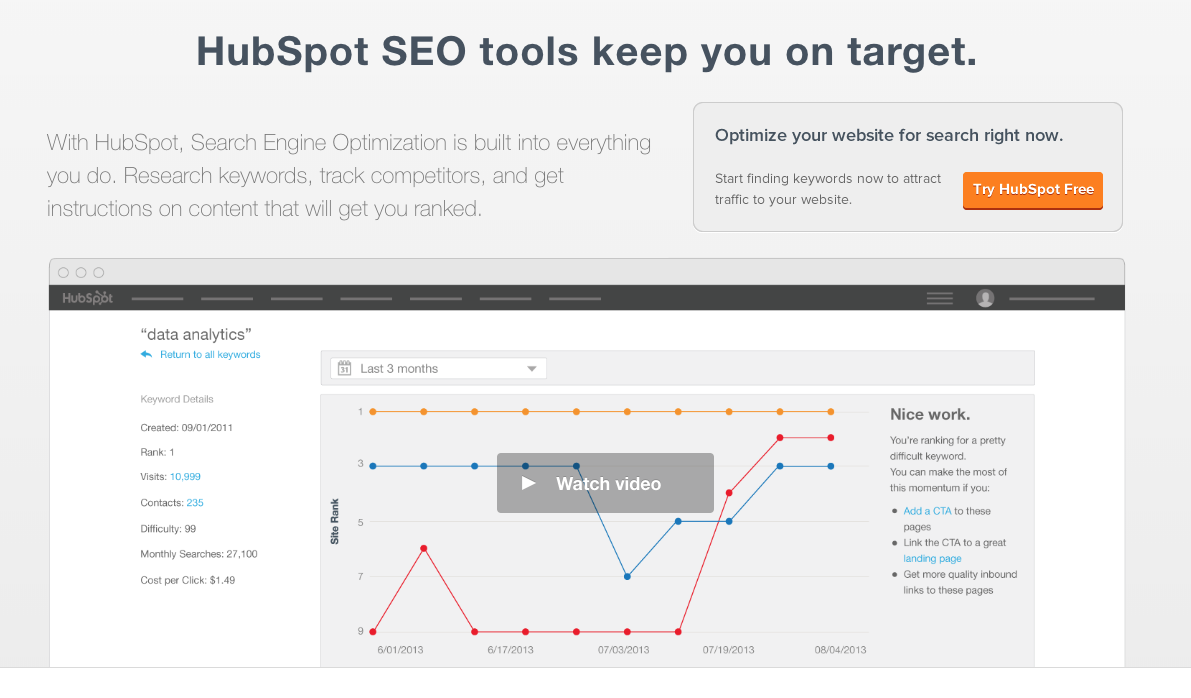
This strategy drove traffic and pulled in leads, but it created standalone articles that were targeted to the keyword, not an overall concept.
While related articles might have been linked to one another, marketers (and even Google at the time) didn’t know the value of this so they weren’t optimized or weighted as they should have been.
Take a look at the suggestions in the image above. HubSpot suggests adding a CTA, creating a landing page, and increasing inbound links. There’s no mention of setting up an internal linking structure at all.
The keyword-based, loosely related blog posts of the past largely existed in a vacuum because they didn’t need to do much more.
That was then…
Now, it’s the internal linking structure that provides an architecture search engines use to derive context from what we’re writing. They then use that context to pair it with the intent of what searchers are looking for.
Enter the robots and intent research
As a result of this new emphasis on internal links and expertise, how we do keyword research has changed.
Today’s content optimization has much more to do with user intent rather than simply targeting a word or phrase and writing about it.
Intent research goes deeper into keywords, taking into account a searcher’s motivation when they search particular things.
Think of this as why they are conducting their search as much as what they actually searched for.
The reason intent research is surging right now is that Google’s algorithm is rewarding searches that are more contextually based.
In other words, Google wants to see content that gives people what they want. It’s pairing intent (the questions — the intentions — people have when they search) with context (the answers we provide in our content).
The content with the more context that matches a user’s intention gets ranked higher.
This is, in fact, directly in line with what Google set out to do. It’s mission, “To organize the world’s information and make it universally accessible and useful,” is being fulfilled by the growing wisdom of its search engine.
Google’s robots are becoming more human. (I’d say this is terrifying, but I don’t want to upset them…and I know they’re reading this.)
Search engines are rewarding content that understands human needs and behaviors.
That’s also the reason intent research has lasting power well beyond its newfound attention.
The search engines are evolving. They are not going to regress and become less human.
OK, admittedly I recently rewatched the entire Battlestar Galactica reboot, so I may have sentient robots on the brain, but it’s true.
Remember the old-school keyword research with the disconnected articles?
The robots have moved beyond that. They want to bring users to sites that are authorities on the subject at hand; not individuals who just wrote a one-off piece on a keyword then went on to other things. Consistently writing on a topic shows greater knowledge and importance; you’re a dedicated expert. That’s why Google won’t reward standalone articles anymore.
Here’s how keywords and search engines have evolved in the past few years:
Topic clusters and pillars
Another sign that search engines are paying deeper attention to what we’re writing about is the growth of topic clusters.
Topic clusters are groups of topics focused on a specific piece of information, otherwise known as a content pillar.
The idea behind a pillar strategy is to link the topics to the pillar and the pillar back to the topics. The interlinking between topics and pillar is what gives the strategy its SEO juice.
The linking architecture notifies search engines that the site is an authority on that topic and, therefore, is a prime source of information.
If the search engines are considering intent when someone searches (which they are), and linking architecture tips off the search engines that you have a lot of information about a certain topic (which it does), then wouldn’t it be worth your time to optimize for intent and develop a pillar strategy?
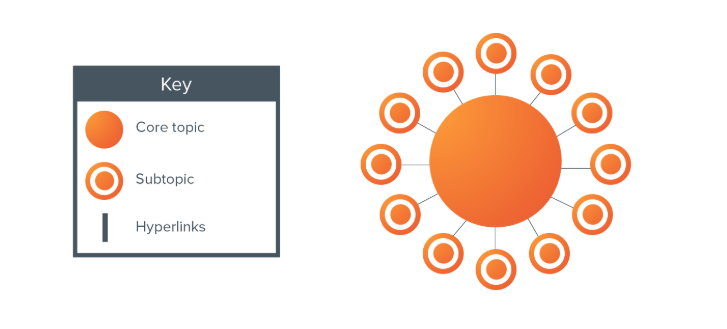
“Sure,” you’re probably saying, “all I need to do is write a pillar on whatever topic I want to rank for. I had 16 extra hours in my day anyway.”
It’s true that a well-thought-out, well-written pillar strategy will serve you well with the SEO gods. However, you don’t necessarily need to scope a pillar in order to reap the rewards of topic clusters.
What you will need to do, though, is build out a cluster strategy.
Take a look at your editorial calendar to identify common subject themes.
Chances are, there are multiple articles that have been published and are in the pipeline that relate to one another. This is the beginning of a cluster.
Capitalize on those and make sure related articles link back and forth. (Then, while you’re at it, start creating that pillar after all.)
LSI keywords
Over the past few years, we’ve also seen search engines evolve to better understand what we’re saying, what we mean, and how we talk to them.
Search engines have also become much savvier at picking up on latent semantic index (LSI) keywords, words and phrases that are related to a search topic, than ever before.
That means that they can now recognize the concepts we’re writing about, beyond simply spotting a keyword phrase.
The rise of LSI keywords negated the “need” to keyword stuff in order to tell search engines what our content is about.
Instead, search engines can now detect nuanced language and related terms to better understand the content’s intended message.
For example, check out the results a Google search for “college housing decor” renders:

Here, Google’s smart enough to know that “dorm room ideas” are appropriate — in fact, better — results, even though the keywords themselves don’t match.
In this case, Google knew what I wanted to research better than I did.
Schema markup
Schema markup is the code used to provide information to search engines so that they better understand your content.
When you use it, you’re talking to the search engines in their own language.
Though they’ve evolved, the search engines still don’t fully understand the content we write. So we can use schema to let the search engines know what we believe to be important, and they then can tag our content in the “right” way.
Schema gives them a clear picture of what we’re writing about and how to categorize it.
For example, let’s say you’ve written an article with instructions on how to tie a tie. You can use “how-to” structured data, or schema markup, to have your directions appear in the search results. (Google also explains how to do in its developer forum.)
So your markup will look like this:
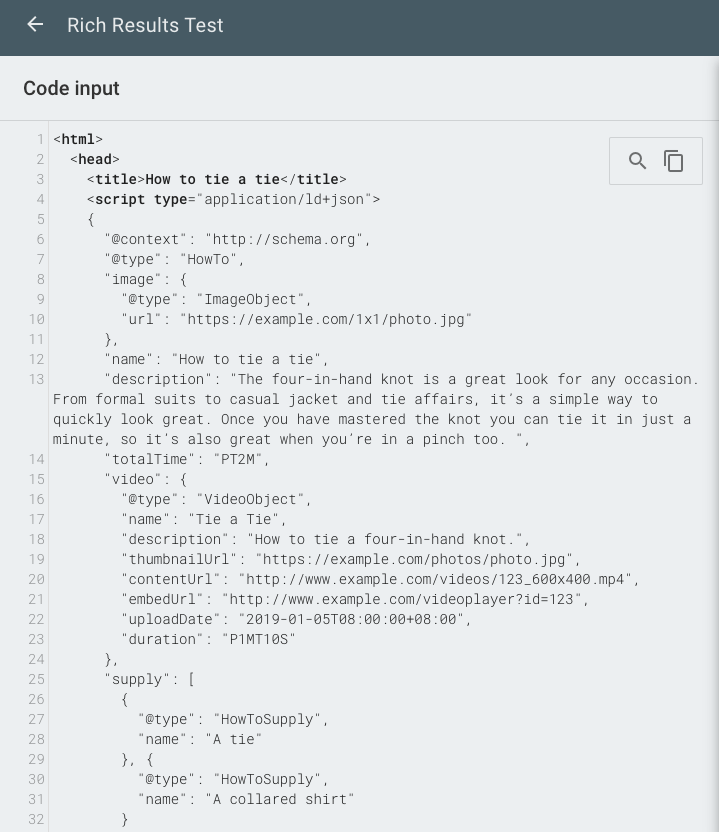
And the result will appear like this:
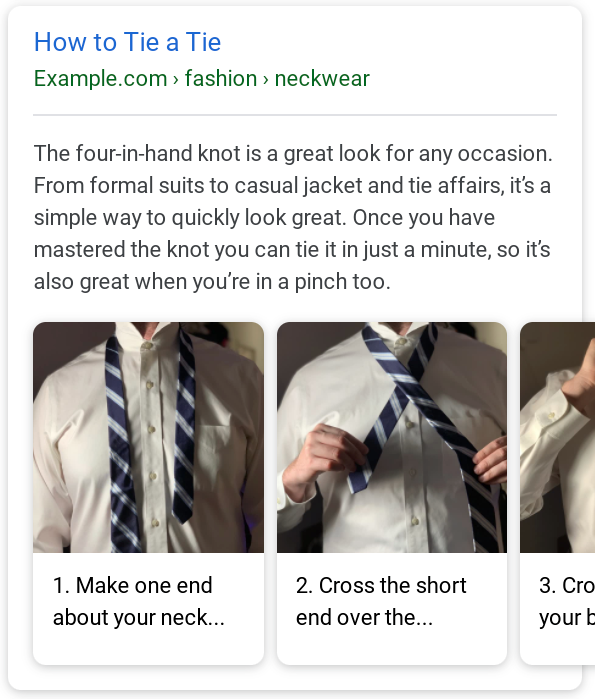
Senior front-end developer Melissa Smith explains:
Search results that have schema applied inform the user faster.
The user is able to see details of your page at a glance which help them decide whether to click through or move on to a more relevant one.
This information also helps your website rank better for all kinds of content types, get found, and in turn, get more clicks.
Schema is that extra boost that clarifies to the search engines what you’d like them to do.
Google, thankfully, provides a tool that’s user-friendly and will walk you through the process.
The good news for those of us who aren’t coding gurus is that basic schema markup is accessible via Google’s Structured Data Markup Helper.
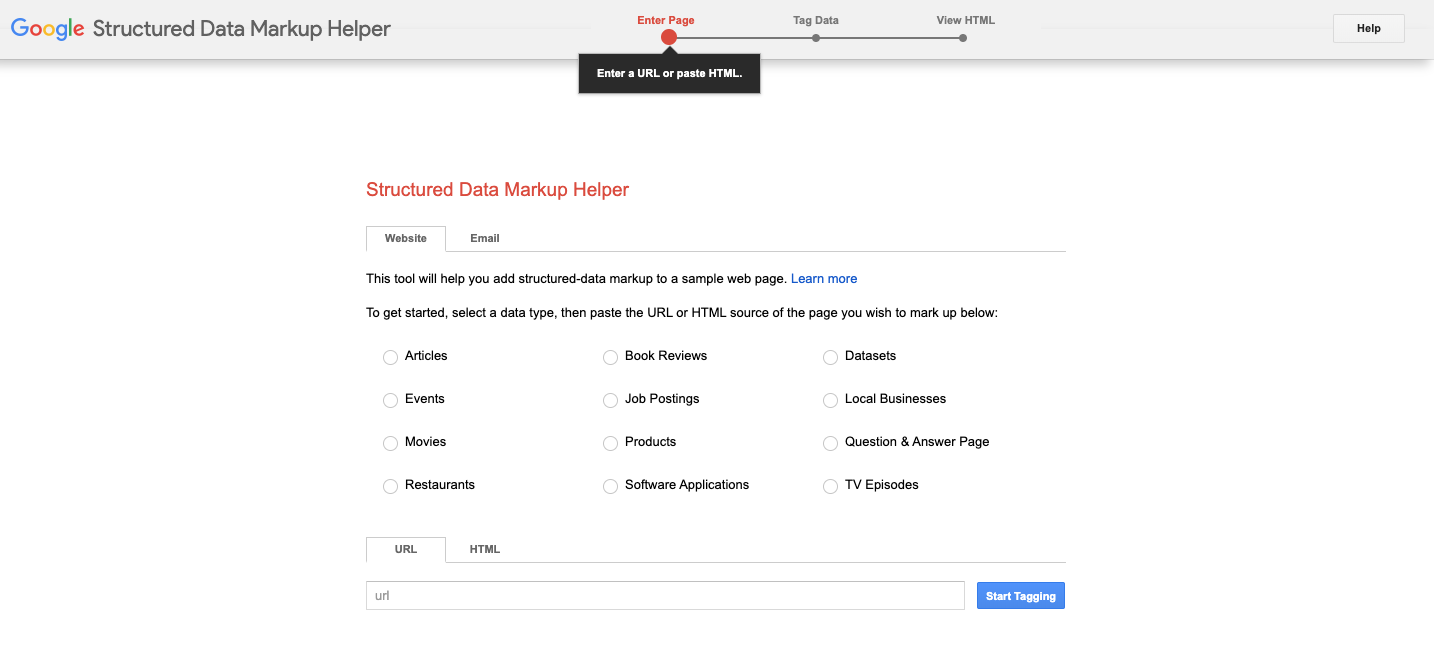
Among many benefits of adding schema, it can help you enhance a local business listing; add ratings, offers, and reviews to search results; and instruct Google’s crawlers to index your videos.
This, paired with LSI keywords and topic linking, provides the search engines with a comprehensive snapshot of the content and how best to place it in a search result.
Has intent research replaced keyword research?
Knowing that we need to approach content with an understanding that robots want us to write like humans can be a lot to process.
But when you realize that our content is being ranked (or valued depending on how you look at it) based on the intent of the searcher, it makes you wonder if we need keyword research at all anymore.
Has intent research replaced keyword research?
Yes and no.
Intent research has replaced keyword research like I replaced my flip-phone with an iPhone.
I still use a phone to make calls and text, but I can do so much more than that now. My phone has evolved. So has keyword research.
Remember HubSpot’s content strategy page touting the strength of keyword research from six years ago? Today, it has an entirely new story:
HubSpot’s current page doesn’t include the word “keyword” at all. It’s no longer the one main element digital marketers can rely on.
But that doesn’t mean it’s gone away.
It’s just become one part of the overall process that will allow us to create content that can be found by and resonate with our readers.
My colleague and fellow content trainer Brian Casey explained how keyword and intent research work together in this process:
Performing intent research as part of your SEO strategy requires you to go to Google and start learning. Plug in a keyword and answer these questions:
- What content is currently ranking high? Are the top results from companies like mine or that offer a similar product or service?
- What format/structure is the content in? Are the results leading to product pages, informational blog posts, how-to guides, etc.? This can help guide the strategy on what type of content you can create.
- What search intent category does the keyword fall into? Understanding this will help you determine if the keyword aligns with what you can offer. If it’s a transactional or navigational search for something that you don’t offer, find other keywords.
When planning the content you’ll create, go beyond just using keywords, keyword volume, and content type.
Is keyword research dead?
Keyword research has become one part of an overall SEO strategy that puts our readers at the forefront of our content strategy.
It’s certainly not the same as it was a few years ago and it no longer can solely support a content strategy that ranks well by the search engines.
But, the state of keyword research could very well grab a guitar and croon along with Willie Nelson when he sings, “I woke up still not dead again today.”
Digital marketers should still pack keyword research into their bags of tools, but it’s now the start of the SEO strategy process.
Along with intent research, topic clusters, SEO best practices, and schema markup, keyword research lives another day to help our content get found and help educate our customers.
Free: Assessment

